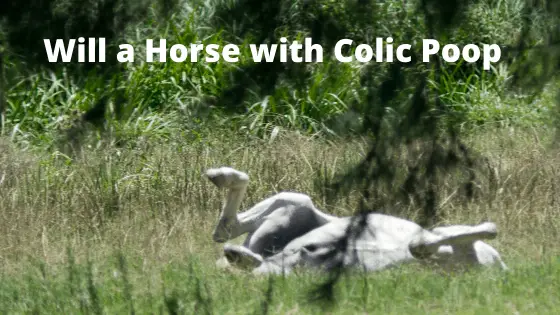Will a Horse with Colic Poop
Will a Horse with Colic Poop – The word “colic” means surgeries, poor results, and recurrence for the horse’s owner. Colic in horses is one of the major leading causes of death in horses in the United States. Over 60,000 Horses Die Each Year from Colic Related Problems
- The American Horse Council estimates there are over 9 Million Horses in the United States
- There are approximately over 90 0,000 Cases of Colic Each Year
- Approximately 60,000 + Die Each Year from Colic Related Problems
If you own the horse and wonder, will my horse with colic poop? Then you should read this post
See Amazons Educational Resources for Horse Diseases
Usually not, but some horses may pass the poop before pain or stool that is present in the intestine after the blockage site, so we can say that it totally depends on the reason why the horse experiences colic.
But if the Blockage continues. The Horse will not be able to eat or poop because of the blockage, and if not remedied can be fatal to the horse.
Colic is the condition in which a horse experiences abdominal pain. Colic can also be detected by poop, such as little or no manure passage, dry or mucus-covered manure, etc.
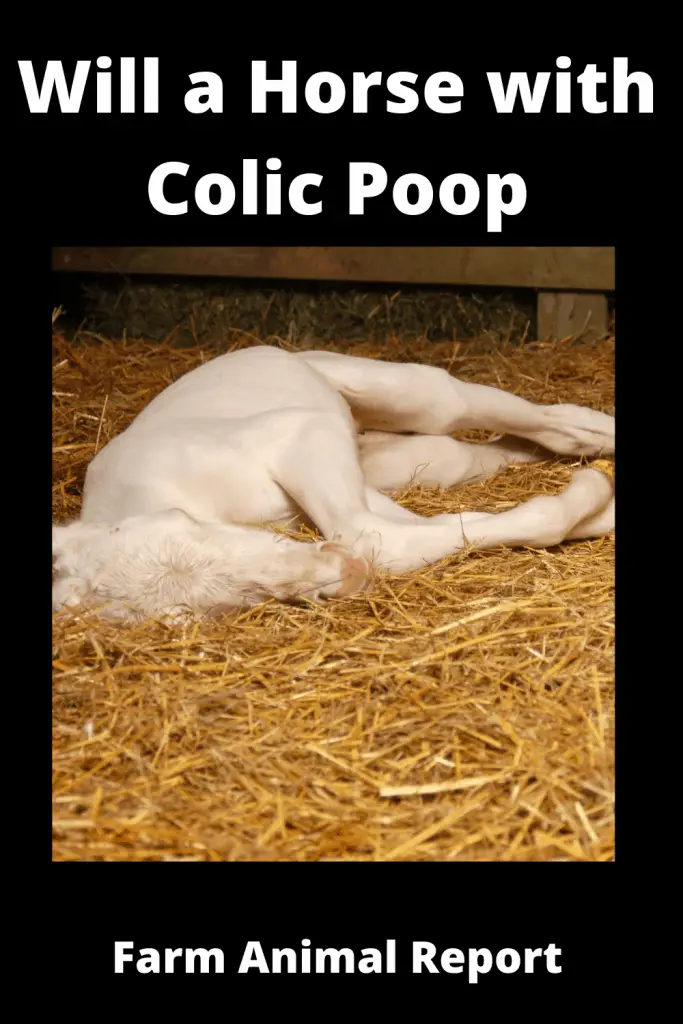
When should I Call the Vet for Colic
Colic is very Serious in Horses. So if you find yourself having Exhausted all the usualy Remedies, It is best to give your Vet a call and follow his instructions. If That fails dont Hesitate to nget The Vet out.
As for a horse owner it is wise to learn how to handle your horse when it begins to show early signs of Colic. It is a problem that many horse owners experience and often it is repeatable.
Colic can also point toward other Issues that are not Gastro – and they might be
- Reproductive Problems
- Kidney Problems
- Bladder Problems
- Bone and Joint Problems
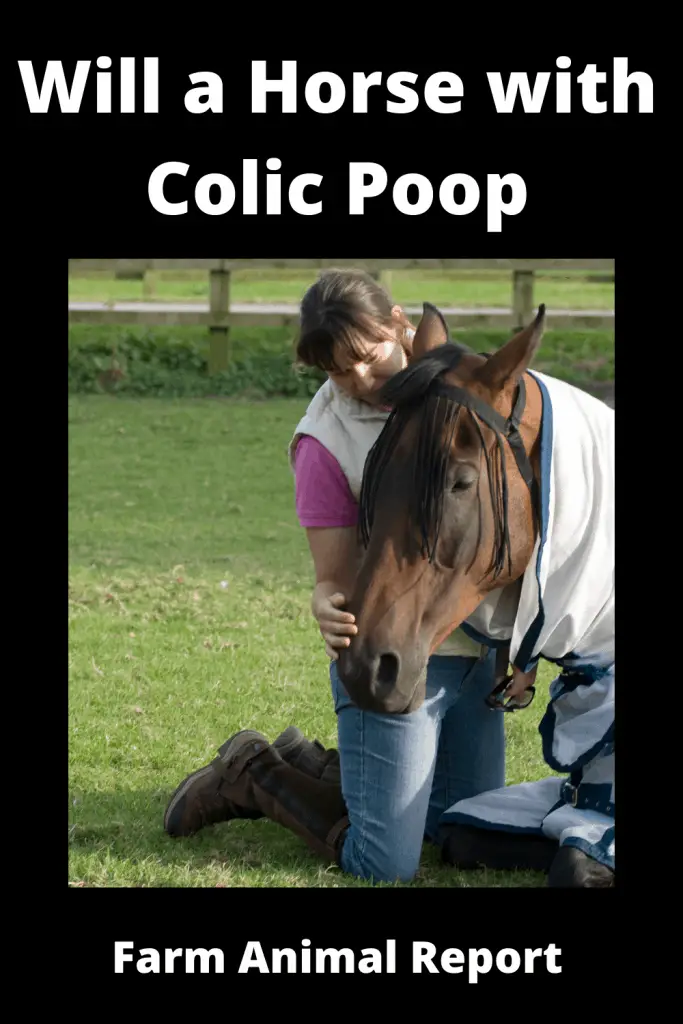
What Should I check before I call My Vet
When you Need to give your Vet a Call it is best to Gather some info for them so when you call the Vet will be able to determine how much pain and how severe the condition of your horse could be.
Here are some of the things you will want to write down for them ( Just a Note it would be good for your own peace of mine to gather these numbers when your horse is healthy, then it will give you a heads up when they might not be feeling well
- Temperature – Normal Temp is 99 – 102 Degrees
- Heart Rate = 30 – 45 Beats per minute
- Respiration Rate – 15 – 35 Breaths per Minute
- Gums – should be pink and moist – should bounce back from pressing / 2 seconds
- Abnormal Color of Gums – Blue , Red, White
- Stethoscope – Stomach Sounds
- Last Stool passage
- Breed and Age of Horses – Some horses are more prone to Colic
- Last Feeding, and watering – any abnormalities
- Gender of Horse
- Any Medications Given – up to 2 weeks
- Colic signs your Horse is displaying
- Duration of the horses discomfort
- Changes in Feed or Enviornment ( Stress ) High grain Diet
What is Colic in Horses?
Colic is a broad term that can be defined as abdominal discomfort and pain. It can occur due to many reasons such as gas, grain overload, impaction, sand ingestion, and parasitic infection.
See Our Guide – 10 Ways Horse Farmers Make Money
This disease can vary from mild to severe, depending on the cause. If actions are taken in time, colic is treatable.
What are the First 22 Signs of Colic in a Horse
As mentioned earlier, colic can be fatal to your horse, so you should closely monitor your horse for any signs and changes in behavior for early detection and treatment.
Here are some signs of colic in horses such as:
- Sweating
- Depression
- Pawing the Ground
- Curling their Lip
- Grinding their teeth
- Refusing to Eat
- Ears Rolled Back
- Extended Belly
- Cowering in corner – strange Behavior
- change in drinking behavior.
- Little or no passing of manure.
- Passing dry or mucus-covered manure.
- Flank watching: Frequently looking at their side
- Kicking or Biting their flank or belly – at the spot giving them pain
- Repeated lying down or rolling
- Holding the head in the unusual position
- Stretching out as if to urinate
- Repeated curling back of the upper lip
- Long capillary refill time.
- Heart rate over 45 to 50 beats per minute.
- Off-colored mucous membranes
- Increased pulse and respiration rates
8 Types of Colic
Colic can be caused by a variety of reasons. That is why it is divided into different types, such as:
- Gas Colic
- Spasmodic Colic
- Impactions Colic – Worming can cause a dead worm impaction
- Sand Colic – Lots of Sand Colic in Sandy states – Florida, Michigan, Calif – Sand will build up inside colon and can obstruct it.
- Twisted Gut
- Displacements
- Strangulations and Torsions
- Idiopathic Colic (unknown reason
- Poor Teeth in Older Horses cannot grind food well – swallow instead chew
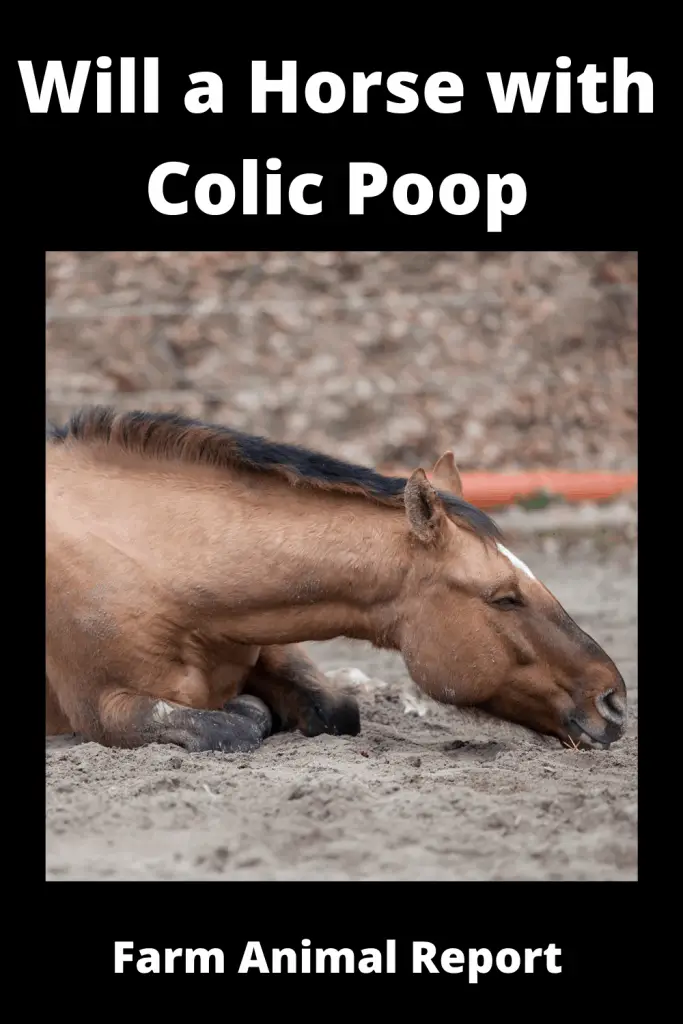
7 Risk factors associated with colic
There are some risk factors associated with colic that you can avoid, including:
- Heavy worm burdens increase the risk of colic.
- The sudden dietary changes increase the risk of colic.
- Poor dental health is associated with impaction colic.
- Low-quality roughage
- Increased or decreased amount of concentrate and grains
- Low level of exercise and activity level
- After pregnancy chances of colic is more
- Drugs – Steroids
- Horses chewing – items , blankets, wood, plastic, twine
Prevention of Colic
Here are some preventive measures by which you can prevent colic in horses:
- You should make sure that your horse has ready access to plenty of fresh, clean water. The average horse will drink anywhere from 5-10 gallons of water per day. If the horse water is Frozen or Dirty they may not want to drink it.
- You should feed the minimum level of grain according to its activity level. Large stones in Feed Pails will cause the Horses to eat slower
- Feed Horses several times a day – They naturally graze all-day – 1 per day horse will gobble and eat too fast. 2 – times Better, 3 Times better still, etc
- You should feed good quality hay to your horse and make sure the horse is not ingesting a lot of sand to avoid sand colic. Matts or Pads that can be swept or shaken, so when food is on the ground prevents the horse from eating dirt and sand as they eat.
- You should offer supplements like vitamin E, selenium, or electrolyte by your vet prescription.
- If you see any sign of colic, immediately contact your vet and place your horse in a well-bedded stable to allow for comfortable and close observation. Remove all food from the stable until the veterinarian arrives.
- Active Parisite Control – Sample feces = Pasture Management – Fecal Egg Counts
- Making Feed Changes Slowly – Pastures
- Sweet Feeds in Large quantities more than 2 -3 Lbs – after Hay –
How do you Treat a Horse with Colic
Your vet will examine the horse and diagnose the cause and then treat it accordingly. This is the general protocol used to treat colic in horses.
- Pain Relief
- Electrolytes/Fluid Therapy
- Antispasmodics for Spasmodic Colic
- Laxatives for impaction.
- Surgery for cases of twisted gut, strangulation, and displacement
How Expensive is Surgery for Horses with Colic
Most Vets will hold off Surgery until the last treatments. The Cost will vary according to the conditions and how long the horse needs to stay after surgery. Ballpark prices run from $3,000 – $7,500. The Horse needs to be taken in, sedated, then has to have recovery time, then transported back home.
A Blockage that will not free up, may not give you any choice but to have surgery to save the horse. When a blockage occurs, poisons can leak into the horse’s system, Pressure can build up and place pressure on its vital organs.
many Times the Vet is not able to tell exactly what the blockage is until they get in and look.
How Long does it take for a Horse to Recover from Colic
It can take 12 Hours – 2 Days for a horse to recover from a simple case of Colic. Things to watch for
- Make sure they have plenty of Freshwater – to keep things flushing
- Let Him Exercise, keep things moving
- Avoid Grain and any sweet feed
- Keep eye on all horse poop
- Give him plenty of forage
- Let him eat slowly – little at a time
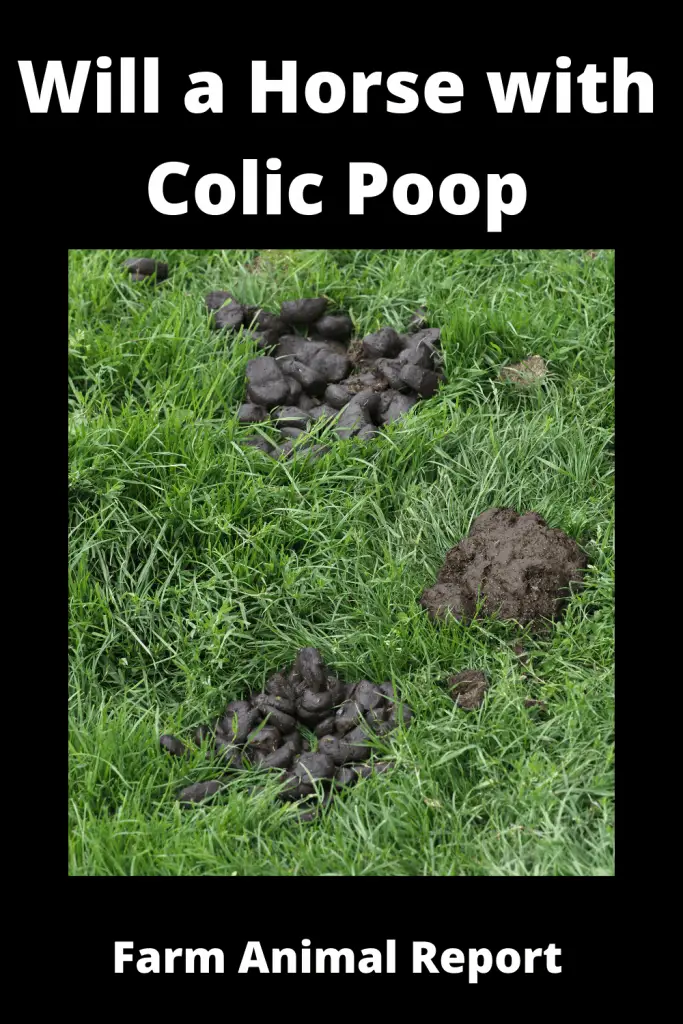
Will a Horse with Colic Eat
Generally a horse suffering from Colic is in alot of discomfort. They will stop feeding, sometimes quit drinking. There is some type of Blockage so anything is added causes more discomfort.
Depending on the blockage, nothing going in and nothing coming out
Should I walk my Horse with Colic
Yes, exercise, if he is willing and able, will keep things moving and help maybe pass the blockage and get it moving. Colic is more prevalent in horses that are not exercising regularly. Horses that are fed once a day, they are hungry and tend to gobble it
What about Horse Insurance
There are companies that will provide horswe insurance for you. There are generally two types.
Medical Insurance – to Cover Vet and Medical expenses
Mortality Insurance – Covers if your Horse Dies
US Equestrian Association
American Horse Counsil
American Quarter Horse Association
List Horse Associations
Conclusion
It is the fact that horses are prone to colic due to the unique challenges of the equine digestive system. You should always take preventative measures and if your horse shows signs of colic, contact your vet immediately.


